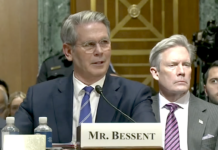
WASHINGTON (GA Recorder) — On the one-year anniversary of Russia’s full-scale invasion of Ukraine, the Biden administration announced an additional $2 billion in weapons and a host of new sanctions targeting Russia’s key industries and government officials.
The Friday announcement came on the heels of President Joe Biden’s historic and surprise visit to Ukraine’s capital Kyiv, where for the first time in modern history, a sitting U.S. president visited a war zone without the protection of American troops.
“You remind us that freedom is priceless; it’s worth fighting for as long as it takes. And that’s how long we’re going to be with you, Mr. President: for as long as it takes,” Biden said while in Kyiv, in a joint statement with Ukraine President Volodymyr Zelenskyy in the city’s Mariinsky Palace.
Friday’s weapons package includes unmanned aerial systems, electronic warfare detection equipment and additional ammunition for arms already provided to Ukraine by the U.S. and allies.
The Department of Defense will not pull the weapons from its own stocks — as it has with several previous security aid packages. Rather it will purchase the equipment for Ukraine under a new contract, according to the Pentagon.
“One year into a war of aggression waged by a permanent member of the U.N. Security Council, our allies and partners worldwide stand united and resolute. Putin’s reckless, illegal war is not just an all-out assault on Ukraine’s sovereignty and a historic threat to European security. It is also a direct attack on the system of rules, institutions, and laws that the world built at such great cost after World War II—a system that rejects aggression and respects the rights of all countries, big and small,” U.S. Secretary of Defense Lloyd Austin said in a statement Friday.
Sanctions, restrictions, tariffs
New measures across multiple other departments will pressure Russia’s energy, financial and industrial sectors; impose travel and property restrictions on hundreds of Russia’s ministers, regional governors, and military personnel; and increase tariffs on roughly 100 Russian metals, minerals, and chemical products worth $2.8 billion to the Kremlin, according to the White House.
The State Department plans to impose visa restrictions on more than 1,200 members of Russia’s military and bar entry to the U.S. for three Russian military officials for their involvement in “gross violations of human rights.”
Secretary of State Antony Blinken announced new sanctions on dozens of Russian officials — among them, the Russian-appointed official who oversaw the alleged theft of thousands of artifacts from Ukraine’s Kherson art museum — and several companies and vessels, including the Russian Federal Nuclear Center and the Kremlin’s maritime intelligence agency.
Meanwhile, the Department of Justice has filed a civil forfeiture complaint against six New York and Florida properties owned by Russian oligarch Viktor Vekselberg, who allegedly profited from sanctions evasion and money laundering.
“I think you’ve seen our announcements today of all the different ways we’re going to continue to hold Mr. Putin accountable as well as to continue to support Ukraine,” National Security Council spokesman John Kirby told reporters on a call Friday morning.
“President Biden, and our whole government really, has rallied the world in response, working with allies and partners to provide Ukraine with security, economic, humanitarian assistance, and of course, leading unprecedented efforts to impose costs on Russia for this aggression.”
The one-year mark did not arrive without criticism of Biden’s efforts, including that the administration has acted too slowly.
“It is not enough to do the right things; we need to do the right things at the right speed,” Senate Minority Leader Mitch McConnell said in a statement.
“The Biden Administration and our allies must act more decisively to ensure that both our collective assistance to Ukraine and the investments we each make in our own militaries take place at the speed of relevance,” the Kentucky Republican continued. “Every experience tells us it is weakness and hesitation that provoke Putin. The road to peace lies in speedily surging Ukraine the tools they need to achieve victory as they define it.”
Texas Republican Rep. Michael McCaul, chair of the House Foreign Affairs Committee, wrote in an op-ed for Fox News that the administration “has consistently been a step behind throughout this war.”
“They (Biden administration officials) have repeatedly claimed sending certain advanced weapon systems — from Stingers to HIMARS, to Patriot air defense systems, to Western main battle tanks — would somehow provoke Putin. Yet, when these provisions were eventually sent, months later, there was no Russian retribution,” McCaul wrote in the article co-authored with retired Army Gen. and Fox News analyst Jack Keane.
Greene, other Republicans oppose more aid
Right-wing Rome, Georgia Republican U.S. Rep. Marjorie Taylor Greene told Fox News host Tucker Carlson Thursday night that she plans to re-introduce legislation that would “force” an audit on the billions in U.S. aid to Ukraine.
Greene is among a contingent of GOP lawmakers who oppose more aid to the war-torn country, and is among the 20 Republicans who demanded concessions from House Speaker Kevin McCarthy during the multiple rounds of voting in January before he clinched the gavel.
In response to whether the U.S. is providing the types of weapons Ukraine needs quickly enough to secure a win, Kirby said the administration is working “in lockstep in real time” with the Ukrainians.
“We have proven able and willing to evolve the capabilities as the war has evolved,” Kirby said Friday. “And contrary to some criticism, we are actually working as well to get ahead of where we think the war is going.”
Kirby did not provide details when pressed by reporters on whether the U.S. will supply F-16 fighter jets Ukraine has requested.
Both Democrats and Republicans who support continued aid to Ukraine reiterate that U.S. national security is at stake, particularly in relation to rival nations forging stronger ties with the Kremlin.
Blinken suggested this week that China was considering providing “lethal support” to Russia.
Kirby on Friday declined to answer questions about the comment.
However, he said the U.S. has “additional information that Iran’s support for Russia’s war is expanding.”
“We’re going to be watching this very closely to see what, if anything, actually transpires and whatever transactions are actually made,” Kirby said. “The larger point here is, as I had talked about before, there is this growing defense cooperation between Iran and Russia. And it’s not only certainly going to make things in Ukraine more difficult, but it could certainly make the security situation in the Middle East more difficult for our partners and friends there.”
G7 meeting
Biden met virtually for about an hour-and-a-half with Zelenskyy and G7 leaders early Friday.
The body of seven of the world’s leading economies released a 15-point statement following the meeting condemning Russia’s “irresponsible nuclear rhetoric” and reaffirming coordinated economic sanctions and accountability measures to ensure war crimes are prosecuted.
“We are committed to preventing Russia from finding new ways to acquire advanced materials, technology, and military and industrial equipment from our jurisdictions that it can use to develop its industrial sectors and further its violations of international law,” part of the joint statement read.
Tucked in the statement was also a vow that the governments will work together to address “significant revenues” Russia gains from the export of diamonds, rough or polished.
Shortly after the G7 meeting, Blinken delivered remarks in New York City at the United Nations Security Council, on which Russia holds permanent membership.
“One year and one week ago — on February 17th, 2022 — I warned this council that Russia was planning to invade Ukraine,” Blinken said. “I said that Russia would manufacture a pretext and then use missiles, tanks, soldiers, cyberattacks to strike pre-identified targets, including Kyiv, with the aim of toppling Ukraine’s democratically elected government.
“Russia’s representative — the same representative who will speak today — called these, and I quote, ‘groundless accusations.’ Seven days later, on February 24th, 2022, Russia launched its full-scale invasion,” he continued.
The council met one day after 141 member nations of the U.N. General Assembly approved a resolution condemning Russia’s continued invasion.
The U.N. Human Rights Office of the High Commissioner estimates that at least 8,000 Ukrainian civilians have died as a result of the war, with another 13,300 injured, though real totals are likely to be much higher.
Ukraine and Russia have not independently released battlefield losses, but British defense officials last week estimated that 40,000 to 60,000 Russian troops had died, with those injured reaching up to 200,000, according to several media reports.
Western officials told reporters in a late January briefing that battlefield deaths and injuries were estimated at 200,000 on both sides.







